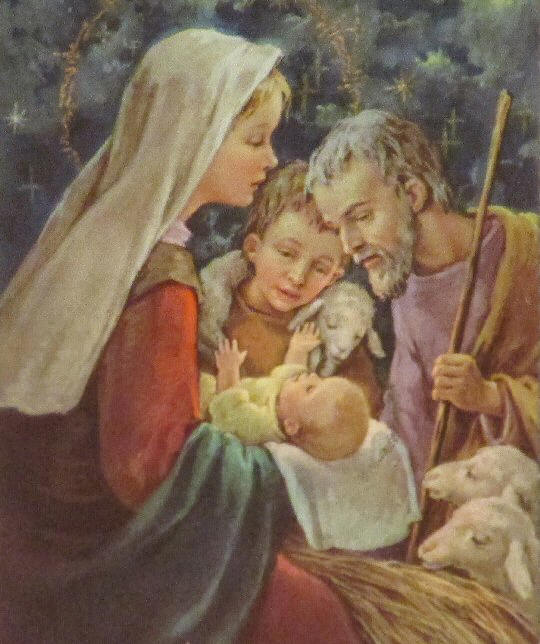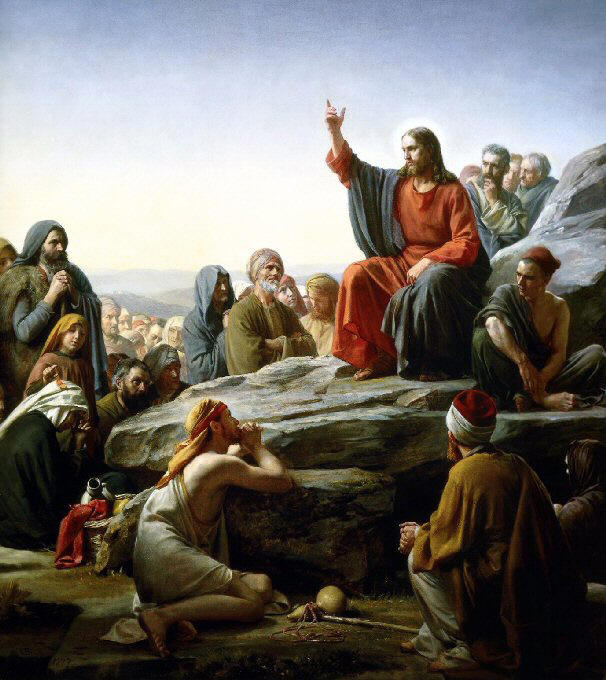Our Savior, My Redeemer-B
Index
Working Definitions
Savior Ė The one who brings about the result.
Redeemer Ė The person who pays the price to bring about the result.
STEP TWO
JESUS CHRIST - OUR SAVIOR
Jesus, our savior, came into our world
He would become like us in all ways but sin,
entering the world as an infant born of a young virgin named Mary. The good news
was announced by angels to shepherds during their all-night vigils watching their
sheep.
 Everyone went to register, each to his own
town. And so Joseph went from the town of Nazareth in Galilee to Judea, to
Davidís town of Bethlehem Ė because he was of the house and linage of David Ė to
register with Mary, his espoused wife, who was with child. While they were
there, the days of her confinement were completed. She gave birth to her
first-born son and wrapped him in swaddling clothes and laid him in a manager,
because there was no room for them in the place where travelers lodged. (Luke
2:3-7)
Everyone went to register, each to his own
town. And so Joseph went from the town of Nazareth in Galilee to Judea, to
Davidís town of Bethlehem Ė because he was of the house and linage of David Ė to
register with Mary, his espoused wife, who was with child. While they were
there, the days of her confinement were completed. She gave birth to her
first-born son and wrapped him in swaddling clothes and laid him in a manager,
because there was no room for them in the place where travelers lodged. (Luke
2:3-7)
His childhood hinted at nothing remarkable. He
developed and grew as a child in a visibly unremarkable family . . . in an
unremarkable village . . . in an unremarkable country long since dominated by
other empires whose cultures and religions were alien to its own; against which
there was an ongoing struggle for freedom.
Jesus Lived Among Us
He followed his divine fatherís plan for our
salvation, and assumed our human
 nature. He lived like one of us, he gathered
his disciples, told us about his father's kingdom, and he created his church through which humanity receives the
unlimited merits and graces earned by his later redeeming action. But he was
not accepted by the leaders of the people. Both he and his message was rejected
by them who, out of envy and jealousy, had him sentenced to death.
nature. He lived like one of us, he gathered
his disciples, told us about his father's kingdom, and he created his church through which humanity receives the
unlimited merits and graces earned by his later redeeming action. But he was
not accepted by the leaders of the people. Both he and his message was rejected
by them who, out of envy and jealousy, had him sentenced to death.
While at times, some humans choose to follow
their wills over that of Godís, he does not, nor will he ever, turn any
repentant person away. He
stands ready to accept hearts sincere in returning to him. And
when some of the Jewish leaders refused to accept Godís son, Jesus Christ, as
their promised Messiah and had him killed, it may have seemed a victory for the
evil spirits whose purpose was and is to this day to encourage humans to rebel against Godís
love.
Why did God send His Son to suffer this kind of
treatment?
Only a divine person could satisfy for our first
parentís insult against God. It was God's own divine Son who, out of love,
could make divine reparation for this insult and earn for the
human race the gift of being returned again to God's favor. To accomplish
this, he endured the most cruel and humiliating
death as a sacrificial victim at the hands of evil men.
Why?
To pay the price of our redemption and destroy
the hold that Satan had over the human race when our first parents out of pride
cooperated with his evil and rejected God the Fatherís love.
Christ Himself Tells Us . . .
There was a property
owner who planted a vineyard, put a hedge around it, dug out a vat, and erected
a tower. Then he leased it out to tenant farmers and went on a journey.
When vintage time arrived he dispatched his slaves to the tenants to obtain his
share of the grapes. The tenants responded by seizing the slaves.
They beat one, killed another, and stoned a third. A second time he
 dispatched even more slaves than before, but they treated them the same way.
Finally he sent his son to them, thinking, 'They will respect my son.'
When they saw the the son, the tenants said to one another, 'Here is the one who
will inherit everything. Let us kill him and then we shall have his
inheritance!" With that they seized him, dragged him outside the vineyard,
and killed him. What do you suppose the owner of the vineyard will do to
those tenants when he comes? They replied, "He will bring that wicked
crowd to a bad end and lease his vineyard out to others who will see to it that
he has grapes at vintage time." (Matthew 21:23-41)
dispatched even more slaves than before, but they treated them the same way.
Finally he sent his son to them, thinking, 'They will respect my son.'
When they saw the the son, the tenants said to one another, 'Here is the one who
will inherit everything. Let us kill him and then we shall have his
inheritance!" With that they seized him, dragged him outside the vineyard,
and killed him. What do you suppose the owner of the vineyard will do to
those tenants when he comes? They replied, "He will bring that wicked
crowd to a bad end and lease his vineyard out to others who will see to it that
he has grapes at vintage time." (Matthew 21:23-41)
Up pops the same old problem Ė that of our pride.
God does not
force us to love him. He gives us the choice to love him, and through his
Sonís teaching and death, completely freed us from the claim of Satan for our
souls. We are expected to respond with gratitude and love for Christís kindness
and accept the guidance and strengths of the church he created.
It isnít enough to say that ďI only follow the
legal system; I didnít break any laws; I stayed out of trouble.Ē God asks the
same question of everyone: ďYou have done things for yourself, but what have you
done to follow my sonís teaching: to extend charity, mercy and love for others Ė
everyone.Ē
Because Jesus is the Son of
God, what am I to do?
First,
discover what motivates you to do things. Is the reason centered on the "I" of your pride, is it
a desire to help others through a worthy cause? Or is there a desire to
give glory to God for the gifts and talents he has given you? Actions motivated by love for
God find expression through serving those he created.
Secondly, realize that just as
Jesus Christ took on human nature, dwelt among us, and established his church to
minister to all God's people, we each have the responsibility to carry on his work
using our own particular talents
through acts of selfless charity directed by faith
and motivated by love for God and love of our neighbors.
 Everyone went to register, each to his own
town. And so Joseph went from the town of Nazareth in Galilee to Judea, to
Davidís town of Bethlehem Ė because he was of the house and linage of David Ė to
register with Mary, his espoused wife, who was with child. While they were
there, the days of her confinement were completed. She gave birth to her
first-born son and wrapped him in swaddling clothes and laid him in a manager,
because there was no room for them in the place where travelers lodged. (Luke
2:3-7)
Everyone went to register, each to his own
town. And so Joseph went from the town of Nazareth in Galilee to Judea, to
Davidís town of Bethlehem Ė because he was of the house and linage of David Ė to
register with Mary, his espoused wife, who was with child. While they were
there, the days of her confinement were completed. She gave birth to her
first-born son and wrapped him in swaddling clothes and laid him in a manager,
because there was no room for them in the place where travelers lodged. (Luke
2:3-7)  nature. He lived like one of us, he gathered
his disciples, told us about his father's kingdom, and he created his church through which humanity receives the
unlimited merits and graces earned by his later redeeming action. But he was
not accepted by the leaders of the people. Both he and his message was rejected
by them who, out of envy and jealousy, had him sentenced to death.
nature. He lived like one of us, he gathered
his disciples, told us about his father's kingdom, and he created his church through which humanity receives the
unlimited merits and graces earned by his later redeeming action. But he was
not accepted by the leaders of the people. Both he and his message was rejected
by them who, out of envy and jealousy, had him sentenced to death. dispatched even more slaves than before, but they treated them the same way.
Finally he sent his son to them, thinking, 'They will respect my son.'
When they saw the the son, the tenants said to one another, 'Here is the one who
will inherit everything. Let us kill him and then we shall have his
inheritance!" With that they seized him, dragged him outside the vineyard,
and killed him. What do you suppose the owner of the vineyard will do to
those tenants when he comes? They replied, "He will bring that wicked
crowd to a bad end and lease his vineyard out to others who will see to it that
he has grapes at vintage time." (Matthew 21:23-41)
dispatched even more slaves than before, but they treated them the same way.
Finally he sent his son to them, thinking, 'They will respect my son.'
When they saw the the son, the tenants said to one another, 'Here is the one who
will inherit everything. Let us kill him and then we shall have his
inheritance!" With that they seized him, dragged him outside the vineyard,
and killed him. What do you suppose the owner of the vineyard will do to
those tenants when he comes? They replied, "He will bring that wicked
crowd to a bad end and lease his vineyard out to others who will see to it that
he has grapes at vintage time." (Matthew 21:23-41)